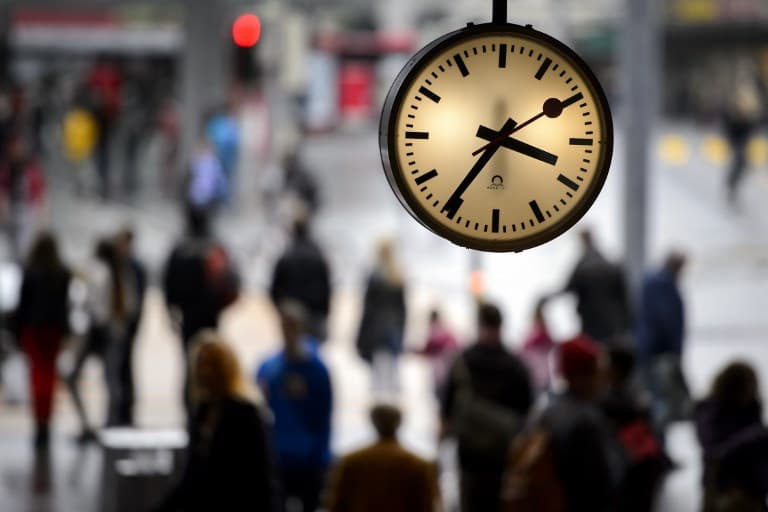Switzerland bides time on daylight savings decision

Swiss clocks will go forward an hour on Sunday morning as summer time begins. But after the EU parliament voted to scrap to end the traditional changing of the clocks in spring and autumn from 2021, the future situation in Switzerland is uncertain.
Switzerland held out for several years against the introduction of daylight savings.
But in 1981 – in the interests of practicality – the country finally followed the lead of its neighbours and adopted the practice of moving clocks forward an hour in spring for summer time and then setting them back an hour in autumn for winter time.
The next such time change is this Sunday, March 31st, at 2am. This will mean more light in the evenings but will also mean darker mornings.
But the future of such jumps in time in Switzerland remains uncertain after the EU parliament on Tuesday voted overwhelmingly in favour of ending the practice of changing the clocks.
The parliament also said it should be up to each individual member state to decide whether to stick to summer time or winter time in future.
According to the draft legislation passed by parliament the EU member states that decide to stay on summer time will put their clocks forward for a final time in March 2021.
And those countries that prefer to stay on winter time will put their clocks back for the final time in autumn 2021.
The bill is now the official position of the EU parliament. But it will be up to the European Council to make a final decision on whether the clocks stop in future.
The vote could put Switzerland in an awkward position if its neighbours opted for different times.
France and Austria are currently looking at remaining on permanent summer time, while Germany has yet to make an official decision.
In any case, Switzerland is free to choose whether it wants permanent summer time or permanent winter time – with just one proviso. Winter time is the current ‘legal’ time in the country so a shift to permanent summer time could well end up in a referendum with the people having the final say.
On Tuesday, the Swiss Federal Institute of Meteorology said in a statement it was following developments both at the European Council and in other countries before making a decision on whether changing time rules made sense and was in the interest of Switzerland.
It said the current practice of changing clocks forward and back would continue until 2021.
Initially introduced to save energy, the change of time in summer and winter in the EU has been strongly opposed for years. Critics cite negative effects on sleep and health or road accidents, as well as the lack of real energy savings.
The clocks will go back this year on October 27th.
Comments
See Also
Switzerland held out for several years against the introduction of daylight savings.
But in 1981 – in the interests of practicality – the country finally followed the lead of its neighbours and adopted the practice of moving clocks forward an hour in spring for summer time and then setting them back an hour in autumn for winter time.
The next such time change is this Sunday, March 31st, at 2am. This will mean more light in the evenings but will also mean darker mornings.
But the future of such jumps in time in Switzerland remains uncertain after the EU parliament on Tuesday voted overwhelmingly in favour of ending the practice of changing the clocks.
The parliament also said it should be up to each individual member state to decide whether to stick to summer time or winter time in future.
According to the draft legislation passed by parliament the EU member states that decide to stay on summer time will put their clocks forward for a final time in March 2021.
And those countries that prefer to stay on winter time will put their clocks back for the final time in autumn 2021.
The bill is now the official position of the EU parliament. But it will be up to the European Council to make a final decision on whether the clocks stop in future.
The vote could put Switzerland in an awkward position if its neighbours opted for different times.
France and Austria are currently looking at remaining on permanent summer time, while Germany has yet to make an official decision.
In any case, Switzerland is free to choose whether it wants permanent summer time or permanent winter time – with just one proviso. Winter time is the current ‘legal’ time in the country so a shift to permanent summer time could well end up in a referendum with the people having the final say.
On Tuesday, the Swiss Federal Institute of Meteorology said in a statement it was following developments both at the European Council and in other countries before making a decision on whether changing time rules made sense and was in the interest of Switzerland.
It said the current practice of changing clocks forward and back would continue until 2021.
Initially introduced to save energy, the change of time in summer and winter in the EU has been strongly opposed for years. Critics cite negative effects on sleep and health or road accidents, as well as the lack of real energy savings.
The clocks will go back this year on October 27th.
Join the conversation in our comments section below. Share your own views and experience and if you have a question or suggestion for our journalists then email us at [email protected].
Please keep comments civil, constructive and on topic – and make sure to read our terms of use before getting involved.
Please log in here to leave a comment.